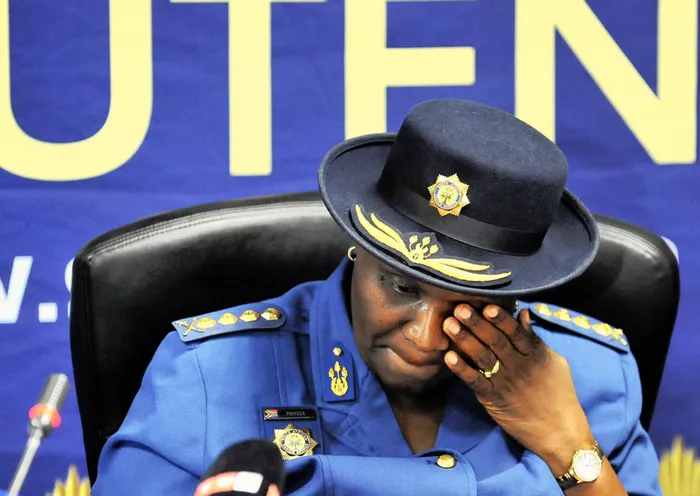Pro-Phiyega police heads face grilling

National police commissioner Riah Phiyega, addresses the media on current arrested suspect dealing with child pornography, at the police headquarters in Braamfontein, Johannesburg.943 10.09.2015 Picture: Itumeleng English National police commissioner Riah Phiyega, addresses the media on current arrested suspect dealing with child pornography, at the police headquarters in Braamfontein, Johannesburg.943 10.09.2015 Picture: Itumeleng English
Durban - Friday sees the start of the unprecedented parliamentary committee inquiry into top police provincial brass stepping into the political arena by publicly supporting their then boss, General Riah Phiyega.
Coming in the wake of Phiyega’s suspension this week, the committee is focused on the next level of command – the provincial police commissioners’ controversial pro-Phiyega statement on August 1, the day after she told President Jacob Zuma why she should keep her job.
This followed the Marikana commission of inquiry finding that she had misled it, and should face a board of inquiry into her fitness to hold office.
In the run-up to the Rule 201 inquiry, questions have been asked why it took the provincial commissioners two weeks to issue that statement after discussions in Phiyega’s presence at the mid-July board of commissioners meeting at Magoebaskloof.
It also emerged at previous police committee discussions that at least three provincial police commissioners did not support the move, but had their hands tied.
Last month the parliamentary police committee received the requested transcripts, and original recordings, of the Magoebaskloof meeting and supporting documentation.
The committee specifically requested the original sound recordings of the Magoebaskloof meeting, because the Marikana commission noted the disappearance of recordings of the key police meeting which decided to go tactical. This decision ultimately led to the police killings of 34 Lonmin miners on August 16, 2012.
It will emerge during the Rule 201 inquiry – the first in the democratic South African Parliament – whether there are discrepancies between the original sound recording and the transcripts.
This is one of the terms of reference of the inquiry, alongside whether police commissioners were truthful when they apologised to the committee in mid August, and whether their conduct overall was “in line with good governance principles”.
Police committee chairman Francois Beukman on Thursday confirmed the first order of the day would be to hand the documentation to all MPs and to receive a briefing from the committee support staff. Discussions would flow from there, and next week a number of witnesses are expected.
Also to be on the agenda on Friday was the questioning of KwaZulu-Natal police commissioner Lieutenant-General Mmamonnye Ngobeni over her stance on the controversial August 1 statement.
She was not present in mid-August, when in a seminal moment for police, the provincial SAPS commissioners apologised to MPs, Zuma and the country for their politicking by backing Phiyega.
That meeting happened after irate MPs united across the party political divide over that August 1 public statement which, the parliamentary police committee said was tantamount to “(blurring) the line between the role of civil servants/police officers and the executive, consisting of elected representatives”.
At the meeting, MPs rejected claims by the top police brass that the statement had been issued to reassure the rank-and-file there were no disputes among their managers, and ordered the retraction of that statement.
This did not exactly happen: the second media statement maintained the aim had been to reassure ordinarily police officials, before it proceeded to water down the in-person apology by saying the committee had misunderstood the provincial commissioners’ intentions.
Daily News